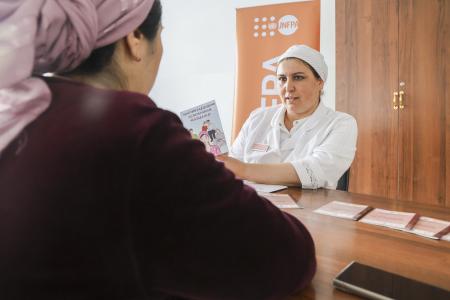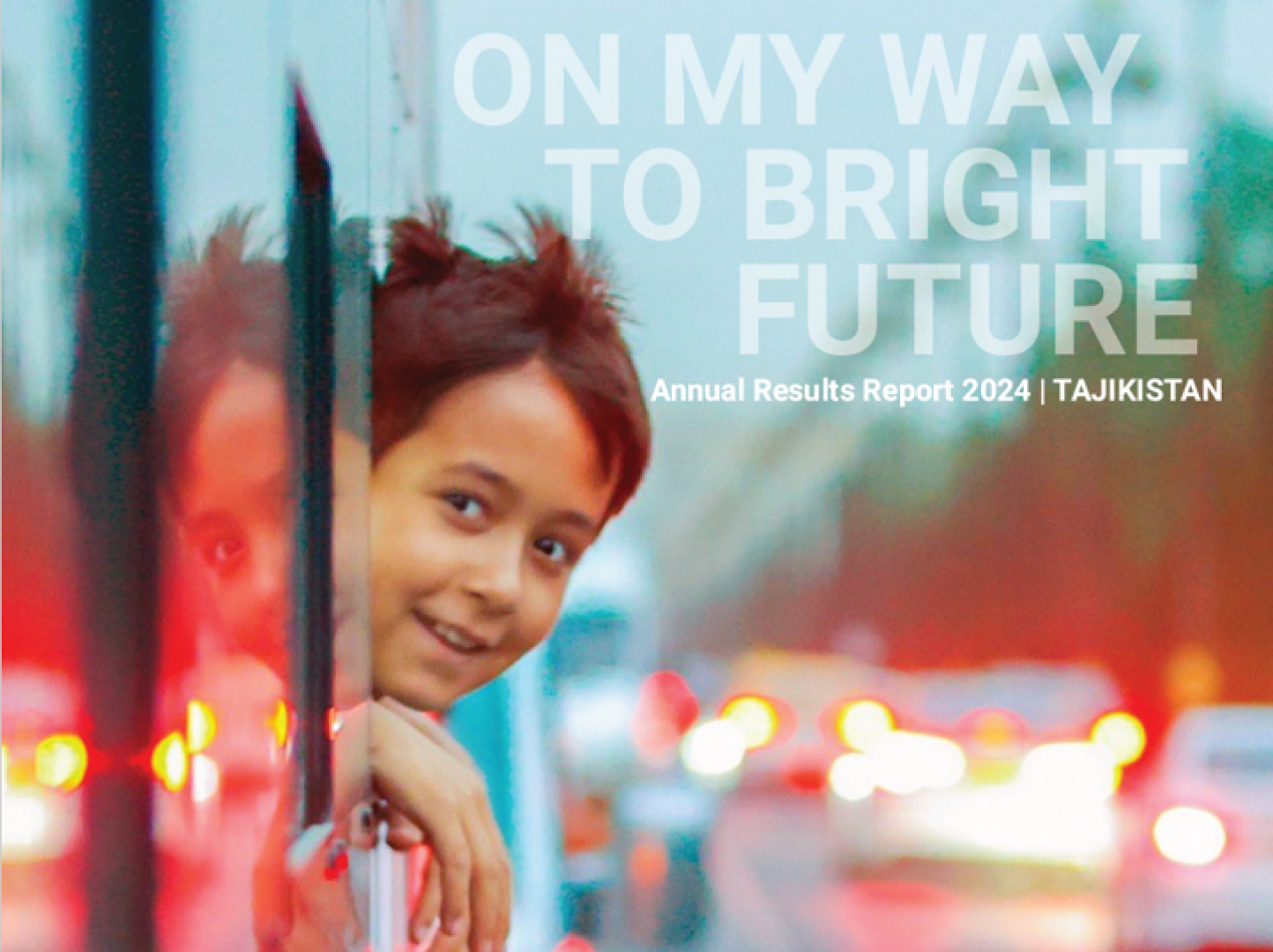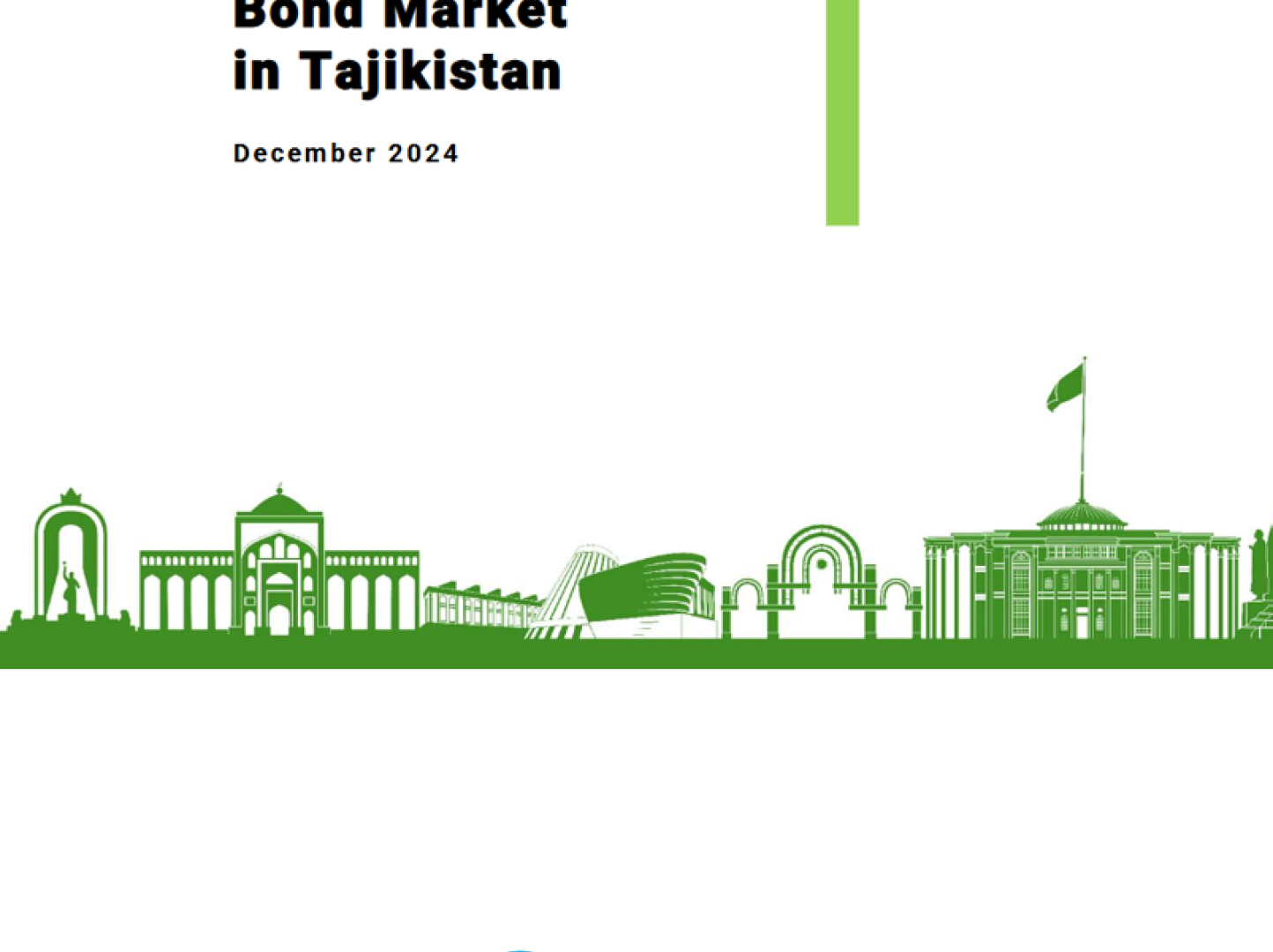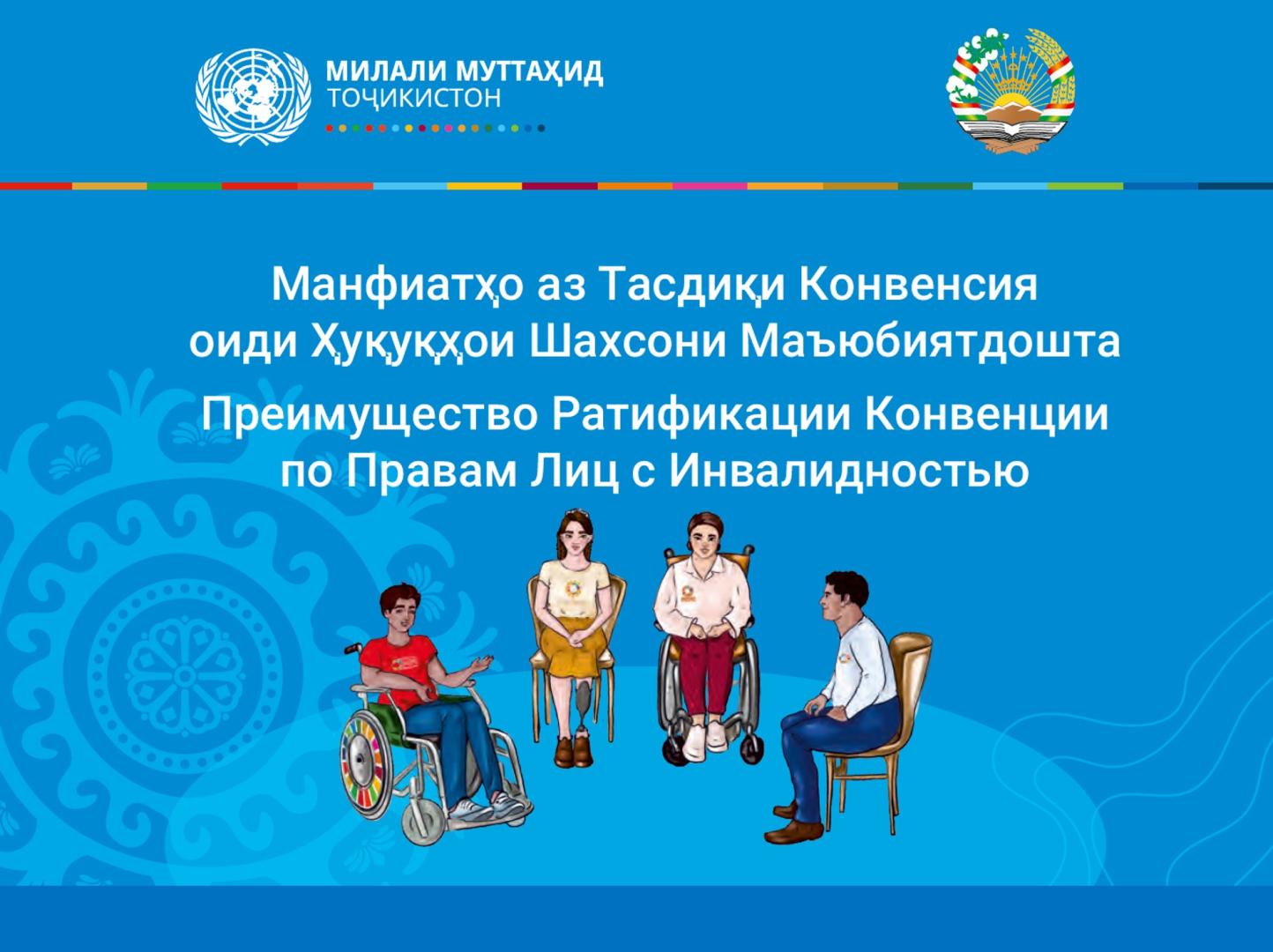Latest
Press Release
08 July 2025
Site in Tajikistan recognized as Globally Important Agricultural Heritage Systems
Learn more
Press Release
26 June 2025
Workshop, led by FAO, discusses strategy for wheat rust disease management in Tajikistan
Learn more
Press Release
26 June 2025
UN80: Our Achievements Should Give Us Hope for a Better Future
Learn more
Latest
The Sustainable Development Goals in Tajikistan
The Sustainable Development Goals are a global call to action to end poverty, protect the earth’s environment and climate, and ensure that people everywhere can enjoy peace and prosperity. These are the goals the UN is working on in Tajikistan:
Press Release
29 August 2023
UN Secretary-General’s "Early Warnings for All" Initiative launched in Tajikistan
The national consultation was co-chaired by the Deputy Prime-Minister of Tajikistan and the UN Resident Coordinator in Tajikistan with active involvement of the lead agencies of four pillars of the Early Warnings for All Initiative.
Deputy Prime Minister of Tajikistan, Mr. Sulaimon Ziyozoda, inaugurated the event, highlighting its significance by stating that the Republic of Tajikistan attaches importance to climate change, disaster risk reduction and supports the call of the United Nations Secretary-General to protect everyone with early warning systems. He also noted: “Coordination of activities of different sectors and stakeholders, involvement of communities at risk, availability of favorable institutional and legislative environment, clear distribution of roles and responsibilities - all these are necessary to create effective and consistent early warning systems”.
UN Resident Coordinator Ms. Parvathy Ramaswami said the launch of the Early Warnings for All initiative is “a crucial step forward in safeguarding the lives and livelihoods of Tajik communities from the impacts of climate change and other risks”, adding that “a whole-of-society approach involving all stakeholders, including civil society and the private sector, will be critical for strengthening and sustaining the early warning services in the country”.
The representatives from relevant ministries, government agencies and development partners presented current advancements in implementing early warning systems in Tajikistan. They collectively identified challenges and prioritized strategies to expand the coverage, integration, and effectiveness of EWS.
The participants also engaged into technical discussions, mapping and a comprehensive gap analysis exercise, drawing from prior assessments, to identify the critical gaps and priority needs for support across the four pillars, agreeing a coordination mechanism and development of an action plan in the initiative’s implementation.
Tajikistan is faced with the frequent occurrence of natural hazards, such as avalanches, earthquakes, floods, mudflows, and landslides, with climate change further exacerbating their impacts. The Early Warnings for All initiative will build improved resilience to such risks in Tajikistan, with support provided across four interconnected pillars of EW4All: disaster risk knowledge; detection, observation, monitoring, analysis, and forecasting; warning dissemination and communication; and preparedness and response capabilities.
Globally one third of citizens are still not covered by early warning systems. EW4All Action Plan was launched at the UN Climate Change Conference (COP27) held in Egypt in November 2022 for further investment across knowledge, observations and forecasting, preparedness and response, and communication of early warnings, with particularly priority placed on vulnerable communities.disaster risk
The Early Warnings for All Initiative calls for a global effort to ensure that such systems protect everyone on Earth by 2027. Early Warning Systems, supported by preparedness and early action, are a proven, effective, and feasible disaster risk reduction and climate adaptation measure, that save lives and provide a tenfold return on investment. Yet, major gaps in early warning systems remain globally, especially when it comes to translating early warnings into risk-informed early action.
Lead agencies of four pillars of the Early Warnings for All Initiative:
United Nations Office for Disaster Risk Reduction (UNDRR)
World Meteorological Organization (WMO)
International Telecommunication Union (ITU)
International Federation of Red Cross and Red Crescent Societies (IFRC)
1 of 3
Press Release
07 July 2023
Interview with Dr Markus Schefer, member of the UN Committee on the Rights of Persons with Disabilities
Dr Schefer was invited to the country by the Office of the UN Resident Coordinator in Tajikistan within the framework of the global campaign to mark the 75th anniversary of the Universal Declaration of Human Rights.
UN RCO: Dr Schefer, could you please tell us about yourself and the goal of your visit to Tajikistan?
Dr Schefer: I am a member of the U.N. Committee on the Rights of Persons with Disabilities and a professor of constitutional and administrative law at the University of Basel, Switzerland. This Committee consists of 18 independent experts from all over the world. We are elected by the State parties for four-year-terms. As independent experts, we do not represent the views of our home countries. We meet twice a year for a time between 3 and 5 weeks. Our main obligation is to monitor the implementation of the Convention on the Rights of Persons with Disabilities in the member states.
UN RCO: Please tell us more about the status of ratification of the Convention globally and the work of the Committee.
Dr Schefer: Today, 187 countries out of 193 UN member states have ratified the Convention; there are only a handful of countries that have not. Kazakhstan ratified it in 2015, and Uzbekistan in 2021. I have visited both countries and I was Rapporteur for Kazakhstan in the review process. In our work, we notice that it is crucially important that countries start a process toward implementation of the Convention, at whatever level they are. In this process, it is equally important to closely consult with organizations of persons with disabilities. They are in a position to identify where the most pressing issues are and what possible remedies may be.
UN RCO: How many persons with disabilities live in the world and how effective are countries in addressing their needs and guaranteeing their rights?
Dr Schefer: In general, we can assume that about 20% of any given population has a disability. For many, this is a surprisingly high number. We are surprised, because we usually do not meet many persons with disabilities in public spaces, be it in the streets, in schools, at work or in recreational activities. The main reason is that many persons with disabilities cannot participate, be it for lack of accessibility, lack of education, non-inclusion in the workplace or particular obstacles for political participation. This is what the CRPD is designed to remedy.
UN RCO: In your opinion, when Tajikistan will be ready to ratify the Convention?
Dr Schefer: Today, Tajikistan is ready for ratification. It is intensively working on many projects designed to implement the rights of persons with disabilities. Ratification would add crucial support to these efforts. Particularly the State party review process, in which our Committee issues recommendations to the State, provides guidance for further measures by the State. There is no threshold of implementation that would have to be achieved before ratification. The sooner a country ratifies the Convention, the clearer the path for the realization of the rights of persons with disabilities becomes.
UN RCO: What are other important things a country needs to keep in mind to proceed with the ratification process?
Dr Schefer: All across the world, I hear the argument that tight finances do not allow to take substantial steps toward implementation of the rights of persons with disabilities. This view overlooks the fact that there are many measures a State party needs to take that do not involve large expenditures. Walking around Dushanbe, I see a great many new buildings, including high-rises, being erected. If the proper accessibility standards are considered from the beginning of the planning process, rendering new buildings accessible will come at very little extra cost. This is a chance for Tajikistan; it allows the country to utilize its rapid economic development to substantially further the rights of persons with disabilities.
I have also met many people who think that the Convention is solely about services for persons with disabilities. To be sure, it does contain many rights to services. But it is not confined to these rights. It also guarantees civil and political rights, such as the right to participate in political and public life, or the right to be free from inhuman and degrading treatment. Particularly political participation of persons with disabilities is of central importance for the peaceful development of any political system, as they represent a very large minority of about 20% of the population.
UN RCO: What is the experience of countries which ratified the Convention most recently? Which challenges they experience?
Dr Schefer: Implementing the Convention not only requires to change the laws and to implement them properly. It also requires, on a much more fundamental level, that society’s attitudes towards persons with disabilities change. That an impairment of a person is not seen as a medical aberration that renders the person less valuable, but that impairments are but one aspect of the great diversity of human beings. And that we value and cherish this diversity, as we do it in many other societal sectors. Such change takes time, and it does not occur on its own volition. Every single State party in whose review I have participated is confronted with many challenges, irrespective of its economic or political power.
UN RCO: What would be your advice to the Government of Tajikistan in terms of the timing for ratification of the Convention?
Dr Schefer: With all appropriate deference and humility, I would suggest that Tajikistan is ready for ratification. There is no need to wait, and there are no advantages of postponing ratification. As this year marks the 75th anniversary of the adoption of the Universal Declaration of Human Rights, the UN will host a high-level event with participation of the Heads of States and Governments on 11-12 December in Geneva, Switzerland. This will be an opportunity for UN Member States to submit their pledges on transformative changes and progress in the cause of human rights. In this context, I would urge the Government of Tajikistan to submit a pledge on ratification of the CRPD as this is one of the two core human rights Conventions not ratified by the country yet.
1 of 3
Press Release
19 May 2023
Tajikistan experience presented in the High-Level Meeting on the Mid-term Review of the Sendai Framework for Disaster Risk Reduction
President of the General Assembly Mr. Csaba Kőrösi, Deputy Secretary-General H.E. Ms. Amina J. Mohammed, Special Representative of the Secretary-General for Disaster Risk Reduction Ms. Mami Mizutori and Türkiye Earthquake Survivor Mr. Mustafa Kemal Kilinç addressed the opening of the event. During the meeting, the participants exchanged their views on the achievements in the implementation of the goals and objectives of the Sendai Framework, as well as the difficulties and gaps towards its implementation.
The Republic of Tajikistan was represented by the Chairman of the Committee of Environmental Protection under the Government of Tajikistan Mr.Bahodur Sheralizoda. He highlighted the importance of the implementation of the Sendai Framework in achieving the sustainable development goals of Agenda 2030 and informed about the measures taken by the country in the implementation of the Sendai Framework, including the adoption of the National Disaster Risk Reduction Strategy and its Midterm Program.
Mr. Bahodur Sheralizoda also presented country’s experience and achievements on disaster risk reduction, mentioned priorities to be addressed and called on the international community and partners to enhance cooperation in this area.
The high-level meeting provides a platform for Member States, the United Nations system partners and other stakeholders to reflect on the findings and recommendations of the MTR SF and formulate a forward-looking and risk-informed approach to more effectively address systemic risk. The meeting will adopt a political declaration to renew commitment and accelerate implementation of the Sendai Framework up to 2030.
1 of 3
Story
29 May 2025
‘We are the present’: Tajik climate activist urges leaders to include youth voices in dialogue
At the end of April, Fariza Dzhobirova attended a Model United Nations Conference on Glaciers’ Preservation in Tajikistan’s capital, Dushanbe, where she represented Switzerland.For Ms. Dzhobirova, it was a rehearsal of sorts for the actual High-level Conference on Glaciers’ Preservation which began on Thursday in Dushanbe. There, she will serve as a panel member representing her own country.“The [Model UN] conference gave me a platform to raise my voice, collaborate with like-minded peers from across the region and develop policy recommendations that we hope will influence real-world decisions,” she said.The High-level Conference on Glaciers’ Preservation, hosted by the Government of Tajikistan and supported by a variety of United Nations agencies, will work to underline the extreme urgency of melting glaciers, elevating it as a global climate and development challenge. Youth voices are the present and the futureBefore the conference, we sat down with Ms. Dzhobirova to discuss what motivates her climate activism. What inspired you to get involved in the climate movement?Growing up in Tajikistan, where more than 90% of our freshwater comes from glaciers, I’ve seen how climate change is already impacting people’s lives. Rivers are shrinking, water is becoming less accessible, and natural disasters like landslides and floods are affecting more and more communities.I’ve met a family who lost their home because of mudflow. I saw a teenage girl from that family of the same age as me that had totally different problems because of this climate-related disaster. I was thinking about my classes. She was thinking about how to survive.And I know there are many examples similar to this - farmers whose land can no longer be irrigated and children whose futures are at risk. Seeing this pain and injustice made it impossible for me to stay silent or uninvolved.Participating in the upcoming Glaciers’ Preservation conference means a lot to me. It’s about raising the voices of people who are often left out of global discussions. For me, it’s a chance to speak on behalf of my generation and my country, and to show that young people are ready to be part of the solution.What message do you hope to share at the conference about the impact of climate change on your community and generation?Being invited to speak is a great responsibility for me. It’s a chance to represent not only Tajikistan, but the voice of a generation.My message is that young people are not just the future — we are the present, and we are ready to contribute today. Climate change is not only about the environment — it’s about how we live, how we work, how we learn. It affects our opportunities, our mental health, our ability to plan for the future. And yet, many young people are still excluded from decision-making processes.At the conference, I want to encourage leaders and policymakers to truly listen not just to the facts and data, but to the experiences and hopes of young people. When you give youth a platform, you don’t just invest in their potential — you strengthen the resilience and sustainability of entire communities.Youth voices are becoming increasingly important in global climate conversations. How do you see the role of young people in shaping solutions?I truly believe that young people have a unique role to play in shaping more just, inclusive and forward-looking climate solutions. We bring fresh ideas, the courage to question outdated systems and a strong sense of responsibility for the future.In countries like Tajikistan, where glaciers are directly connected to people’s livelihoods, youth are already stepping up. What we need now is more trust and investment in young people. We don’t expect to solve everything alone, but we do hope to be included — in dialogue, in decision-making, and in designing real solutions.Protecting glaciers and water resources is not just a technical challenge; it’s a human one. By working together — across generations and borders — we can make our region stronger, more resilient, and more united in the face of climate change.
1 of 5
Story
18 October 2024
A beacon of hope: How safe havens are transforming lives in Tajikistan
Here, within the walls of the Room for Medical and Social Rehabilitation of GBV Survivors, women and girls who have endured unimaginable pain find not only shelter but also a lifeline - a chance to rebuild their lives with dignity.Dr. Nargis Zokirova, an obstetrician-gynaecologist, has been at the heart of this project since 2021. With compassion and resilience, she has guided GBV survivors through the darkest moments of their lives, providing essential medical care, psychological support and, most importantly, a safe space where they can begin to heal. One case that deeply moved Dr. Zokirova involved a 16-year-old girl who was pregnant after being sexually assaulted by a neighbour. When she arrived at the GBV survivors’ room, she was too traumatised to speak, her eyes filled with fear and despair. The facility offers everyone free health services, including emergency care, treatment for GBV-related injuries, and HIV and AIDS testing. However, it was Dr. Zokirova’s gentle and compassionate care and unwavering support over time that allowed the young girl to feel comfortable enough to break her silence. The girl shared her harrowing story, and with Dr. Zokirova’s help, she received the medical care, psychological counselling and specialist referrals she desperately needed. The room became her refuge, a place where she could regain her strength and begin to hope for a better future.UNFPA has established 21 similar rooms across Tajikistan in partnership with the Ministry of Health and Social Protection of the Population. Each one offers a sanctuary for survivors of gender-based violence through a range of essential services, including health care, psychological support, temporary lodging and meals, and referrals to other sectors, all free of charge. This kind of survivor-centred, multi-sectoral response to GBV remains rare in Tajikistan, where protocols and capacity among front-line workers are still limited."I was deeply moved by the professionalism, dedication, and love provided by Dr. Nargis Zokirova and others to women and girls who have experienced unimaginable trauma," said Florence Bauer, UNFPA Regional Director for Eastern Europe and Central Asia, who visited the facility in June. "These safe spaces embody UNFPA's unwavering commitment to ending gender-based violence and protecting and empowering survivors to rebuild their lives towards a brighter future." In another case Dr. Zokirova remembered, a 14-year-old girl arrived at the room 22 weeks pregnant, after a sexual assault by her aunt’s husband. Her mother, desperate and heartbroken, had attempted a dangerous at-home abortion, which led to severe health complications. The young girl was brought to the maternity house in critical condition to receive emergency treatment. The doctors were able to save her life and the life of the fetus. Once she was stable, the young girl was referred to the medical and social rehabilitation room for GBV survivors, while authorities arrested and jailed the perpetrator. “When the girl came to us, she was paralysed by shock, silent and suicidal," Dr. Zokirova recalled. “But over time, through our support, she and her mother found a way to rebuild their lives.” But the work is far from over. More than 40 per cent of women in Tajikistan reported problems even accessing basic health care, particularly in rural areas, according to a Demographic and Health survey. And there are only five shelters in the country providing longer-term care to GBV survivors, three of which are operated by NGOs without any state support. UNFPA has been working to improve these conditions by increasing the quality and coverage of GBV services. Its rooms for GBV survivors are located in districts where no other NGO or government-supported shelters are available, and it is advocating for more state funding for shelters in all regions of the country. Dr. Zokirova also believes that many more women in her community are suffering in silence, unaware of the available support. She has urged community leaders and local activists to spread the word about the rooms and the services they offer. “If more women knew about our room, we could reach so many more, and perhaps help many more women and girls who are suffering from violence and its consequences,” she said.
1 of 5
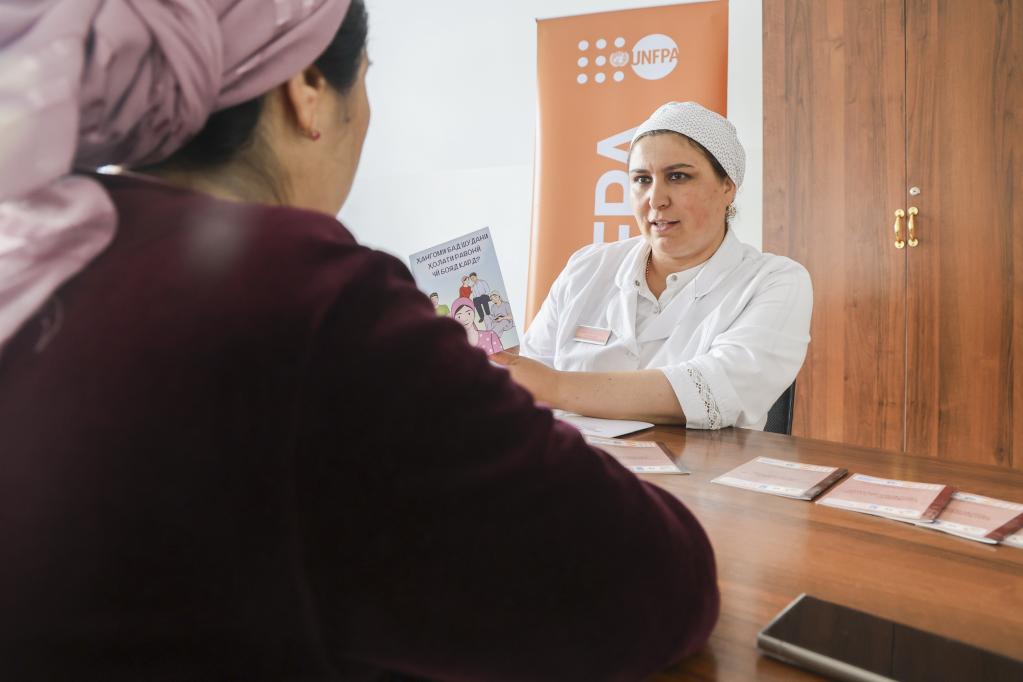
Story
03 October 2024
Looking back at 18 years of operational successes: CARICC Council meets in Ashgabat
In the face of growing threats posed by drug trafficking and related organized crime, the countries of Central Asia, with support from UNODC, came together in 2006 to form the Central Asian Regional Information and Coordination Centre for Combating Illicit Trafficking of Narcotic Drugs, Psychotropic Substances and their Precursors (CARICC) as a platform for regional counter-narcotics collaboration. Today, CARICC comprises seven member states, 18 observer states, and three international organizations with observer status: Interpol, the Cooperation Council for the Arab States of the Gulf (GCC), and the Southeast European Law Enforcement Center (SELEC).CARICC assists member states in joint operations by facilitating real-time information exchange and overcoming bureaucratic barriers. It also conducts a strategic analysis of the drug situation to identify areas requiring coordinated action. The Centre maintains a centralized database tracking drug trafficking trends to enable proactive operational planning. Furthermore, CARICC offers training and capacity-building programmes for law enforcement agencies, enhancing their capabilities to fight drug trafficking.Over the years, CARICC has developed expertise in controlled delivery operations and shares this knowledge with partners. The Centre’s international status and its liaison officers have facilitated the establishment of networks with international organizations and beyond its member states, enhancing the effectiveness of its operations.The Centre leads several long-term initiatives, including Operation REFLEX, targeting new psychoactive substances, and Operation SUBSTITUTE, aimed at preventing the diversion of controlled chemicals to illicit trafficking. It also engages in short-term operations focused on specific drug-related crimes, leading to significant drug seizures and legal actions against traffickers.CARICC’s impact on countering drug trafficking is significant: since its inception, it has contributed to 85 international counter-narcotics operations, resulting in the seizure of over 7.5 tons of narcotic drugs, more than 62 tons of precursors, and the arrest of 122 members of drug trafficking networks. On 12 September 2024, at the invitation of Turkmenistan, the Council of National Coordinators of CARICC Member States came together in Ashgabat to take stock of CARICC’s activities and give strategic direction for the future. Participants also discussed the rapidly evolving drug situation in Central Asia following the opium cultivation ban issued by the de facto authority in Afghanistan. Of particular concern was the spread of synthetic drugs, as well as the multiple indications of an emerging production of new psychoactive substances in several countries of the region. “Illegal drug trafficking, a persistent threat to humanity in the 21st century, is further exacerbated by the growing spread of new psychoactive substances and synthetic drugs. Urgent and comprehensive action is needed to address this crisis. It is essential to highlight our collective commitment through our ongoing collaboration with CARICC. We are continually strengthening this partnership by expanding the Centre’s reach and enhancing its role,” stated Yazguly Agabaev, Deputy Minister of Internal Affairs of Turkmenistan.“The evolving drug situation in the CARICC member states demands coordinated and targeted measures to suppress drug smuggling. A joint action plan is needed to investigate major drug seizures and develop effective responses,” said Atageldi Yazlyev, Director of CARICC. Dr. Oliver Stolpe, UNODC Regional Representative for Afghanistan, Central Asia, Iran and Pakistan, noted: “CARICC has made significant steps in enhancing regional cooperation and operational effectiveness. It is imperative that we sustain and build upon these achievements to address the dynamic challenges of drug trafficking in the region. Maintaining CARICC’s strategic priorities and operational capacity is essential for continuing our progress in this critical area.” For more insights into CARICC’s work, watch: CARICC: 18 years of operational successes in countering illicit drug traffickingCARICC capacity-building programmes: Open-source intelligence regional training course For further information, please contact:Nurangez AbdulhamidovaCommunications and External Relations SpecialistUNODC Regional Office for Afghanistan, Central Asia, Iran and Pakistan Email: nurangez.abdulhamidova[at]un.org
1 of 5
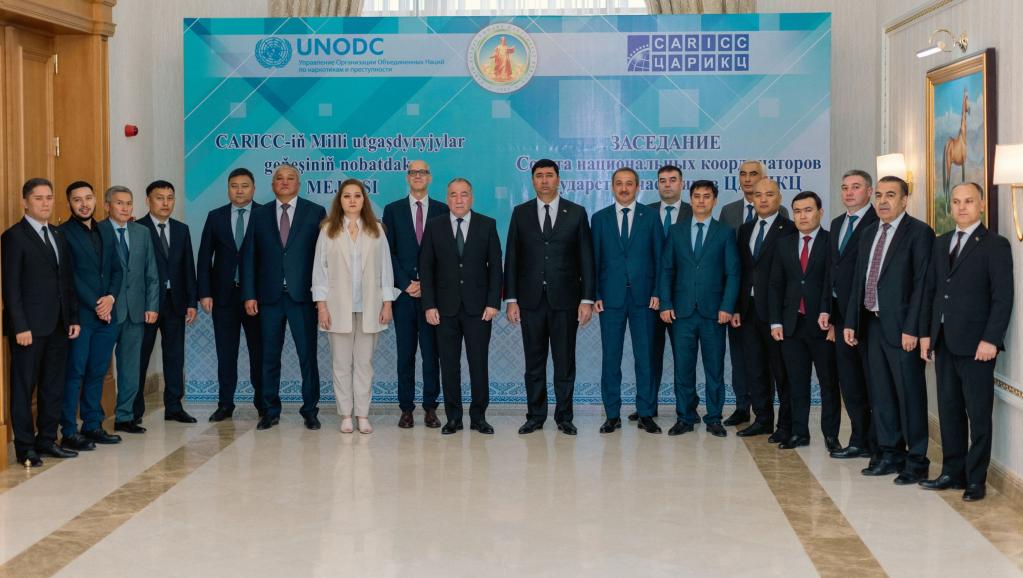
Story
30 April 2024
“We haven’t had any sepsis cases in months,” reports a maternity hospital in Tajikistan
“Some of my colleagues are a bit confused,” confesses Dr Rosa Nodirshoeva, who is known here simply as Dr Rosa. “We have not had any cases of sepsis for a few months now. They find this unusual,” she adds, smiling at her collaborator, Dr Joyrine Biromumaiso, before declaring, “but you and I, we know the reason.”Dr Rosa shifts comfortably in her chair. She has an air of authority about her. This suits her position as a senior doctor at the large Maternity Hospital Number 1 in Dushanbe, Tajikistan. Dr Rosa has worked at the health facility for over 30 years and knows it like the back of her hand.She works closely with Dr Joyrine, an expert on infection prevention and control based at the WHO Country Office in Tajikistan. Today they are discussing how much has changed since the start of their close collaboration, just over 3 years ago. Preventing health care-associated infections“Infection prevention and control training have changed the way we work,” Dr Rosa declares. “Before, nurses with years of experience could accidentally infect a patient while performing even the simplest procedures, such as inserting a catheter, because they simply weren’t aware of the right measures and techniques to prevent health care-associated infections. They had not been taught well.”Dr Rosa explains that the facility had been working on improving infection prevention and control for decades. However, since working with Dr Joyrine, they have been able to strengthen their capacity dramatically and accelerate progress.She gives examples of improvements made at the facility, adding that staff now pay close attention to infection prevention and control measures, and understand how important this is to provide safe, quality care.“Our staff apply the 5 moments of hand hygiene and have become much more diligent in how we clean the facility. My colleagues know how to properly dispose of used syringes, masks and other medical waste. Our facility has clearly articulated the need for disinfectants and other health products used for protection. We now have devices with disinfectant solutions throughout the facility. Patients want to receive quality care and all these changes help us to keep them, and our health workers, safe from health care-associated infections.”Dr Rosa notes that a simple reminder is sometimes enough to prevent a tragedy, and that patients themselves have become more aware of their own health. “They may come in for a treatment, but if they see that the doctor has not cleaned his hands, they speak up.” Fewer infection casesAt the end of the corridor, the discomfort of a mother-to-be can be heard. Almost 1000 babies per month are born in this facility. One in every 5 babies is delivered through a caesarean section, as the facility receives women with complications from all regions of the country.Before, at least 2 or 3 cases of septic complications were registered in the maternity hospital every month, but this situation has changed in recent years. The facility has also seen a dramatic reduction in other infections, including hepatitis B among health workers. The improvements made in infection prevent and control have been key to this success.Dr Joyrine is proud of the achievements of Dr Rosa and her staff. She herself knows how proper infection prevention and control practices save lives. She was in western Africa at the height of the Ebola crisis, which killed over 11 000 people. As a frontline worker, she trained health workers to provide safe treatment and to protect themselves from the virus, but it killed many of her colleagues.After this terrible experience, Dr Joyrine is one of the biggest advocates for implementation of infection prevention and control programmes in health-care facilities. “In Tajikistan, I often talk about my experiences in western Africa and East Africa and about what I have seen in the field.”She explains that the topic of cultural norms often comes up. “By having an open conversation about cultural practices and traditions – for example, those related to burial rites – the Tajik health-care workers start to understand how infections can spread. They are keen to learn about WHO’s guidance and to implement the practices and techniques which we recommend. This is why we see such improvements.”Since Dr Joyrine started working in Tajikistan, much has changed. With technical support from WHO, the country developed new national guidelines on infection prevention and control in 2022. Financial support from the United States Agency for International Development (USAID) has been crucial in developing further guidance for health workers on how to put these measures into practice. “Infection prevention and control are everything”Over the past few years, based on the WHO guidelines on infection prevention and control and in collaboration with other organizations, such as the United Nations Children’s Fund (UNICEF), over 8000 health workers across the country have been trained in infection prevention and control. Quality training and communication materials have been developed in national languages.Many partners are supporting Tajikistan to ensure access to adequate water, sanitation and hygiene infrastructure and services, as well as essential materials and equipment for infection prevention and control, to deliver safe care.The hard work continues. Many facilities in the country are still not following proper infection prevention and control practices, and many more health workers require training. Furthermore, the lack of access to safe, running water in health facilities, and the lack of availability of personal protective equipment such as gloves, masks and alcohol-based hand rub, pose major barriers to implementing infection prevention and control measures.With support from USAID, Dr Joyrine will train a monitoring and evaluation team that will be instrumental in keeping track of the progress made in health facilities in all districts of Tajikistan. Key next steps for the country also include ensuring that courses on infection prevention and control are incorporated into all medical curricula and offered to health workers in facilities systematically.The establishment of a new cadre of health workers, fully dedicated to guiding and monitoring the proper implementation of infection prevention and control practices in health facilities, is a key WHO recommendation.A cleaner passes the room that Dr Rosa and Dr Joyrine are sitting in. Dr Rosa adjusts her glasses and declares, “Infection prevention and control are everything. If you don't know how to prevent infections, you cannot work in a health-care institution.”
1 of 5
Story
25 April 2024
Enhanced collaboration across borders leads to the interception of narcotics by customs and border officers stationed at the UNODC-supported Border Liaison Offices
Regional cooperation among law enforcement agencies is pivotal in combating transnational organized crime, particularly illicit drug trafficking. The UNODC facilitates member countries in establishing a regional platform to collectively address the challenges posed by drug trafficking. A central component of this effort is the promotion of cross-border cooperation through the Border Liaison Offices (BLOs) network to tackle transnational threats and organized crime effectively.These offices play a pivotal role in identifying and halting various smuggling activities, including narcotics, psychotropic substances, and precursor chemicals, all while facilitating lawful international trade.On 7 March 2024, customs and border officers from the UNODC-supported BLO stationed at the Oybek border crossing point in the Tashkent region of Uzbekistan, in coordination with their counterparts from the BLO at the Fotehobod border crossing point in Tajikistan, thwarted an attempt to smuggle two kilograms of hashish. During the inspection of a cargo van, officers discovered two plastic bags attached to the trailer with magnets, containing a total of 1,981 grams of hashish. The BLOs at the Oybek and Fotehobod border crossing points are two of 24 such offices strategically positioned at key border checkpoints across Central Asia. These offices have been established under the Regional Project on Enhancing Cross-Border Cooperation by Strengthening the Capacity of Border Liaison Offices in Central Asia of Sub-programme 1 Preventing and Countering Transnational Organized Crime of the UNODC Programme for Central Asia 2022 - 2025.This pioneering project, supported by the Government of Japan, strives to establish BLOs across Central Asia, with stakeholder involvement from the Ministries of Internal Affairs, Border Troops, Customs Services, and Drug Control Agencies of each participating country. Its overarching goal is to bolster the capabilities of BLO officers representing various law enforcement agencies in combating transnational organized crime through comprehensive training programmes and the provision of state-of-the-art equipment.Such collaborative efforts highlight a shared commitment to preventing and countering transnational organized crime, making the borders in Central Asia safer and more secure.
*The photos are taken from kun.uzRead more about the projectFor further information, please contact:
Nurangez Abdulhamidova
Communications and External Relations Specialist
UNODC Regional Office for Central Asia
Email: nurangez.abdulhamidova[at]un.org
*The photos are taken from kun.uzRead more about the projectFor further information, please contact:
Nurangez Abdulhamidova
Communications and External Relations Specialist
UNODC Regional Office for Central Asia
Email: nurangez.abdulhamidova[at]un.org
1 of 5

Press Release
08 July 2025
Site in Tajikistan recognized as Globally Important Agricultural Heritage Systems
8 July, Rome - An integrated mountain agropastoral system in Tajikistan has become the first Central Asian addition to the Globally Important Agricultural Heritage Systems, with a pine tree agroforestry system and traditional bamboo and fishery system in the Republic of Korea and an agrosilvopastoral system in Portugal also recognized.“As it extends to new regions and countries, the GIAHS network is once again demonstrating its distinctive role in showcasing agricultural systems that promote traditions nurtured by communities and ways of pursuing their livelihoods in harmony with nature,” said Kaveh Zahedi, Director of the Office of Climate Change, Biodiversity and environment at the Food and Agriculture Organization of the United Nations (FAO). “As we confront the climate crisis and loss of biodiversity, the contribution age old ways to build resilience and use biodiversity sustainably is all the more vital in transforming our agrifood systems to keep up with the challenges.”The systems were formally designated under FAO’s flagship programme during a meeting of the GIAHS Scientific Advisory Group held from 7 to 8 of July 2025. The newest additions bring FAO’s worldwide agricultural heritage network to 99 systems in 29 countries around the globe. Along with the first for Tajikistan, the newly designated systems take the number in the Republic of Korea to nine and in Portugal to two.With rising interest from across the globe the GIAHS designations are set to exceed 100 by the time a Certificate Award Ceremony will take place on 31 October in the context of FAO’s 80th anniversary celebrations. Almosi Valley integrated agropastoral system adapted to mountain conditions, TajikistanThis integrated agropastoral system combines seasonal transhumance of sheep with the cultivation of grapes, cereals, orchards, and vegetables across harsh mountain landscapes. Shaped over centuries, it supports food and livelihood security, conserves agrobiodiversity, and preserves cultural heritage. Rooted in ancestral knowledge, it sustains resilient communities facing soil erosion, water scarcity, and climate variability.The valley hosts diverse ecosystems and a wide range of crops and livestock, including landraces of wheat, barley, and vegetables, and the local Hisori sheep breed. The Pink Toifi grape is central to the valley’s identity, valued for its quality and processed into raisins, syrup (shirini), juice, and wine. Farming is guided by ancestral practices, including contour planting, organic fertilization, the Muchal calendar, guiding agriculture based on environmental cues, and ancient irrigation methods to conserve water.Community management is coordinated through mahalla (neighbourhood) committees, family farms, cooperatives, and collective farms, ensuring knowledge transmission, shared resource use, and cultural continuity.
1 of 5
Press Release
26 June 2025
UN80: Our Achievements Should Give Us Hope for a Better Future
For 80 years the United Nations has stood as the highest expression of our hopes for international cooperation, and as the fullest embodiment of our aspiration to end the “scourge of war.” Even in a world steeped in cynicism, this is a milestone worth acknowledging.The United Nations remains the only organisation of its kind, and the only one to have endured for so long. That longevity is remarkable when we consider the context of its founding: assembled from the rubble of not one, but two global cataclysms. Its predecessor, the League of Nations, had collapsed in disgrace.No organisation is flawless. But to paraphrase the second Secretary-General, Dag Hammarskjöld: the United Nations was created not to take humanity to heaven but to save us from hell. In that mission, it has not failed.We continue to witness heart-wrenching scenes of war—in Gaza, Sudan, Ukraine and elsewhere. The recent escalation between Iran and Israel is a stark reminder of the fragility of peace particularly in the tension-prone Middle East region. Yet amid the violence, we have managed to avert a third global war. In a nuclear age, that is an achievement we can never take for granted. It is one we must preserve with the full force of our efforts. Over the past eight decades, much of human development also bears the direct imprint of the United Nations. Consider the success of the Millennium Development Goals, adopted in 2000 by 189 Member States and more than 20 international organisations, which gave the world a shared roadmap for action. By 2015, compared to 1990, extreme poverty was more than halved. Child mortality had fallen by nearly 50 percent. And millions of children — especially girls who had long been denied the right — had entered school for the first time.Now, as we strive to achieve the Sustainable Development Goals, we must build on that legacy of progress. We must continue efforts to eradicate poverty and hunger, achieve universal health coverage and produce and consume sustainably.There is another story of progress, often overlooked: the dismantling of empire. Eighty years ago, colonialism cast its shadow over much of the world. Today, more than 80 former colonies across Asia, Africa, the Caribbean, and the Pacific have gained independence and joined the United Nations. That transition, supported and legitimised by this Organisation, reshaped the global order. It was a triumph of self-determination, a profound affirmation of the Charter's most fundamental principle: the sovereign equality of all States.Evolving for the futureThe world has changed dramatically since 1945. Today, the Organisation faces a deepening liquidity crisis. Despite the promise of the 2030 Agenda for Sustainable Development, progress has been uneven. Gender equality continues to elude us. Our pledge to limit global temperature rise and protect our planet is slipping beyond reach. These setbacks do not warrant diminished ambition but greater resolve. The United Nations has always shown its worth in times of crisis. Its founders had witnessed humanity at its most destructive and responded not with despair, but with boldness. We must draw on these achievements.The spirit of San Francisco was not utopian. It was grounded in a sober understanding of what was at stake. It held that, even amid deep division, nations could still choose cooperation over conflict and action over apathy. We saw that spirit last September, when world leaders gathered in New York for the Summit of the Future. After difficult negotiations, they adopted the Pact for the Future and its annexes—the Declaration on Future Generations and the Global Digital Compact—by consensus. In doing so, they pledged to renew multilateralism for a world more complex, connected, and fragile than the one imagined in 1945.That spirit endures today. It lives in the resolve of 193 Member States, in the integrity of international civil servants, and in the quiet determination of those who believe firmly in the promise of the Charter. It is carried forward by the Secretary-General’s UN80 initiative, which calls on us to deliver better for humanity; and to look to the future with adaptability and hope.As we mark this anniversary, we must rekindle the call for unity and solidarity that rang out from San Francisco 80 years ago. We built a world order once, in the ruins of war. We did so with vision and urgency. Now, again, we find ourselves at a moment of consequence. The risks are high. So too is our capacity to act. H.E. Mr. Philemon Yang, President of the 79th session of the UN General Assembly
1 of 5
Press Release
26 June 2025
Workshop, led by FAO, discusses strategy for wheat rust disease management in Tajikistan
Organized by the Food and Agriculture Organization of the United Nations (FAO), the workshop was supported by the FAO–Türkiye Partnership Programme (FTPP). The workshop formed part of the ongoing CACRust project (Strengthening Regional Collaboration and National Capacities for Management of Wheat Rust Diseases and Resistance Breeding in Central Asia and Caucasus), a regional initiative aiming to reduce the impact of rust diseases, particularly stripe, leaf, and stem rust, which continue to pose a serious threat to wheat yields and livelihoods across Central Asia and the Caucasus.Wheat rusts are fast-evolving fungal diseases with high epidemic potential. In Tajikistan, where wheat is a staple crop and a cornerstone of national food security, developing a coordinated national approach to address these threats is essential.Participants reviewed the structure and content of the draft National Strategy and Contingency Plan for the prevention and management of wheat rust diseases. They focused on the status of wheat rusts in Tajikistan, and existing management efforts. They also discussed the emergency and rapid response plan for the early detection, reporting and containment of rust outbreaks.The participants emphasized the importance of multi-stakeholder engagement, cross-border collaboration, and knowledge exchange in tackling rust outbreaks. The discussions also reinforced the need for continued investment in research, surveillance, seed production, variety resistance, and farmer training.'Wheat rust diseases pose an increasing transboundary threat that requires a coordinated, science-based response. This workshop has laid the foundation for a robust national strategy that is anchored in evidence, driven by collaboration and focused on safeguarding productivity and resilience. Through the FAO–Türkiye Partnership Programme and the CACRust project, FAO supports Tajikistan’s efforts to strengthen resilience and protect wheat production,” said Aghasi Harutyunyan, FAO Representative a.i. in Tajikistan. The outcomes of this workshop will guide the finalization of the National Strategy, enhancing Tajikistan’s capacity to prevent and respond to wheat rust outbreaks and strengthening the resilience of its agricultural sector.About the FAO-Türkiye Partnership ProgrammesThe objectives of the FAO-Türkiye Partnership Programmes are to provide support to ensure food security, rural poverty reduction, and sustainable forest management; combat desertification; and preserve ecosystems in Azerbaijan, Kazakhstan, Kyrgyzstan, Tajikistan, Türkiye, Turkmenistan and Uzbekistan, and other countries of mutual interest. Established in 2007, the first phase of the FAO-Türkiye Partnership Programme on Food and Agriculture (FTPP) benefited from trust fund contributions totaling USD 10 million, financed by the Government of Türkiye and represented by the Ministry of Agriculture and Forestry. During the first phase of the programme, 28 projects were implemented in 16 countries between 2009 and 2015.In 2014, Türkiye and FAO commenced the second phase of the FTPP along with the first phase of the FAO-Türkiye Forestry Partnership Programme (FTFP) with additional funding of USD 20 million, bringing Türkiye’s total contribution to USD 30 million.
1 of 5
Press Release
25 June 2025
Tajikistan hosts workshop to promote gender-transformative approaches in fisheries and aquaculture
In Tajikistan, women represent the primary labour force in agriculture and contribute significantly to food security. However, their work is often informal, undervalued, and undercompensated. With many men migrating away from rural areas, empowering women has far-reaching benefits, not only for food security, but also for increasing agricultural productivity and supporting rural development overall.To address these challenges, the Central Asian and Caucasus Regional Fisheries and Aquaculture Commission (CACFish), in collaboration with the Regional Office for Europe and Central Asia of the Food and Agriculture Organization of the United Nations (FAO), and FAO’s Representation in Tajikistan, convened a national workshop in Dushanbe to bring together policymakers and practitioners in support of gender-transformative approaches in the fisheries and aquaculture sectors.Gender-transformative approaches are strategies that aim not only to support rural women but address the root causes of gender inequality by engaging women and men to change the underlying norms and power structures that underpin inequality.The workshop drew on findings from a regional gender study conducted by FAO between 2022 and 2024 across CACFish member countries, including Tajikistan. The study provided evidence-based insights into the specific challenges and opportunities for integrating gender considerations into fisheries and aquaculture policies and programmes.Participants explored practical ways to embed inclusive and equitable approaches in their work. These efforts respond to persistent challenges rooted in deeply ingrained social norms that limit women’s recognition, economic empowerment and participation in decision-making. When left unaddressed, such inequalities reinforce power imbalances and contribute to the invisibility of women as economic actors, knowledge holders and agents of change.A key message from the event was that sustainable fisheries and aquaculture systems cannot be achieved without addressing gender-based barriers and enabling women to take on visible, empowered roles across the entire value chain. Achieving this requires effective and participatory policy action.About CACFish
The Central Asian and Caucasus Regional Fisheries and Aquaculture Commission (CACFish) is a regional fisheries management organization that promotes the sustainable development of fisheries and aquaculture in Central Asia and the Caucasus. As part of its biennial work programme, the Commission has prioritized gender equality, undertaking several studies focused on the roles, challenges and contributions of women and men in the sector. By generating data and promoting dialogue on gender dynamics, CACFish supports member countries in designing more inclusive policies and practices that amplify women’s roles in building sustainable aquatic food systems.Read more:Central Asian and Caucasus Regional Fisheries and Aquaculture Commission (CACFish)FAO Fisheries and AquacultureFAO in Tajikistan
The Central Asian and Caucasus Regional Fisheries and Aquaculture Commission (CACFish) is a regional fisheries management organization that promotes the sustainable development of fisheries and aquaculture in Central Asia and the Caucasus. As part of its biennial work programme, the Commission has prioritized gender equality, undertaking several studies focused on the roles, challenges and contributions of women and men in the sector. By generating data and promoting dialogue on gender dynamics, CACFish supports member countries in designing more inclusive policies and practices that amplify women’s roles in building sustainable aquatic food systems.Read more:Central Asian and Caucasus Regional Fisheries and Aquaculture Commission (CACFish)FAO Fisheries and AquacultureFAO in Tajikistan
1 of 5
Press Release
03 June 2025
FAO launches specialized training workshops on brucellosis diagnosis using serological methods
Brucellosis remains a serious threat to public and animal health in many parts of the world, including Central Asia. The training programme equips participants with essential knowledge and hands-on experience in modern serological diagnostic techniques, contributing to national and regional disease surveillance and control strategies.The workshops are part of a nationwide initiative to be implemented across multiple regions of Tajikistan, including Sughd, Khatlon, and the Gorno-Badakhshan Autonomous Region (GBAO). The target audience includes laboratory specialists working under the Committee for Food Security. The trainings will enhance their capacity to conduct accurate and timely diagnoses of brucellosis—an important zoonotic disease that affects both animals and humans.Participants receive in-depth instruction on key topics such as the epidemiology of brucellosis, principles of serological diagnosis, and practical use of diagnostic tools. Specific focus areas include the Rose Bengal Test (RBT), sample preparation techniques, and an introduction to enzyme-linked immunosorbent assay (ELISA).The training offers a comprehensive, step-by-step approach that includes both theoretical instruction and practical sessions. Participants learn the principles behind ELISA and perform ELISA assays using laboratory equipment such as ELISA Readers and Washers. They also gain hands-on experience in implementing and interpreting the Rose Bengal Test (RBT) and the Complement Fixation Test (CFT).Emphasis is placed on test result analysis and interpretation, utilizing specialized ELISA software and customized Excel-based tools developed for data processing and quality control. Participants are also trained in troubleshooting common issues and applying good laboratory practices to ensure the accuracy and reliability of results. “By investing in diagnostic training, we are strengthening a vital line of defense against zoonotic and transboundary diseases. This initiative enhances technical expertise and contributes to building a safer, healthier, and more resilient food system,” said Aghasi Harutyunyan, FAO Representative a.i. in Tajikistan.These workshops form part of FAO’s broader commitment under the Pandemic Fund to improve pandemic preparedness and ensure food security through investments in early warning systems, laboratory infrastructure, and human resource capacity development.
1 of 5
Latest Resources
1 / 11
Resources
04 December 2024
1 / 11


